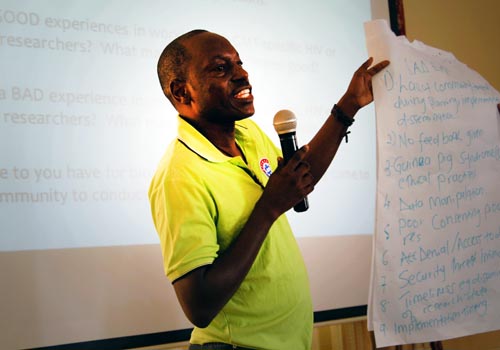Posted by Lucile Scott, October 20, 2014
.JPG)
The meeting attendees visit the offices of GMT Initiative grantee partner HOYMAS in Nairobi.
Despite the fact that men who have sex with men (MSM) are 19 times more likely to have HIV than members of the general population, 80–90% of gay men and other MSM in low- and middle-income countries do not have access to HIV prevention and care services, according to the World Bank. amfAR’s GMT Initiative has provided small grants to nearly 200 grassroots, GMT-led HIV organizations to help them improve and scale-up the HIV services they provide for GMT, often in countries where homosexuality is highly stigmatized or illegal. “The GMT community itself knows how to best reach other GMT,” says Kent Klindera, director of the GMT Initiative. “We are often the first donor for fledgling groups that are of the community, for the community, and by the community, and for me, success is the grantee organizations being picked up by larger donors, like PEPFAR, the Global Fund, and national governments.”
These donors generally fund large, national NGOs and securing their grants requires formalized data collection and program evaluation systems, and strong financial management and strategic planning. Many GMT Initiative grantee partners have not only successfully established HIV testing, treatment, support, and awareness services for GMT in their communities, but have also helped to build GMT advocacy movements, many of which have successfully advocated for their government to include GMT in its national HIV plan for the first time. However, most GMT Initiative grantees are community activists with little prior experience running organizations and limited knowledge about how to document their programs’ success to secure more funding.

MAAYGO’s Kennedy Otieno presents during the meeting.
To help them develop this organizational expertise, the GMT Initiative has provided grantees with technical assistance since its inception. Now, with financial support from Johnson & Johnson, the GMT Initiative is linking 10 grantees in Africa and Latin America with a local expert of their choice to work together on a more formal and ongoing basis. “Donors often have meetings to bring grantees together to build their skills, but after the three or four day training, they go home without enough knowledge to actually use the skills,” says Kent. “This model recognizes that there is expertise locally and those experts can work with grantees over an extended period.”
Recently, amfAR held a meeting in Nairobi, Kenya, for the six African grantees in the program and their mentors to discuss their progress and ongoing challenges. In Kisumu, Kenya, Men Against AIDS Youth Group (MAAYGO) is mentored by Dancan Omiendo, who currently works at ICAP, an international NGO, and previously managed a national capacity-building program while working at LVCT Health, a PEPFAR-funded NGO in Nairobi. Originally, Duncan offered MAAYGO his professional expertise on a volunteer basis, and the amfAR funding has allowed him to work with them more closely and regularly.
.JPG)
Alternatives-Cameroun’s Yves Yomb (right) with John Mathenge (left), director of HOYMAS.
“When amfAR came in we had some gaps in terms of organizational systems,” says Dancan. “We didn’t have a good organizational framework or indicators to measure, and we didn’t have good data collection and reporting tools.” After two years of amfAR support, that has changed. “Now, we are able to monitor the progress of our programs,” says Kennedy Otieno, health and programs coordinator at MAAYGO. With Duncan’s guidance, they have also managed to triple their budget during that time.
Yves Yomb, the executive director of Alternatives-Cameroun, which has been receiving amfAR funding since 2008, has worked with his mentor to improve Alternatives’ monitoring and evaluations system and to develop a formalized curriculum to train GMT peer educators. Alternatives is now using their experience to support newer GMT organizations in Cameroon, where homosexuality is illegal and LGBT are regularly jailed and subjected to violence. “Alternatives-Cameroun was the first LGBT organization in Cameroon and in the French part of Africa, and we are a kind of mentor for the new groups,” says Yves. “It is because we received the support of the GMT Initiative who believed in us and our project that we have had the opportunity to help create an LGBT community in Cameroon.”
Homosexuality is also illegal in Kenya, and earlier this year MAAYGO’s offices were raided by police. When asked what motivates him to do this work despite the risk, Kennedy answered, “In 2005, 6, 7, and 8, I saw the majority of my colleagues dying because of HIV. That is when I said, ‘We need to come out and start talking openly about these issues. If we continue hiding, we are only going to be wiped out by HIV.’ I’m a gay man and I know what challenges my community has.”